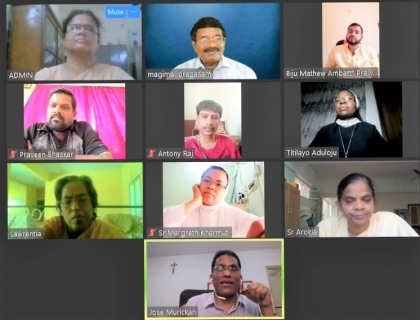First online media education course in India

The first online course on Media Education in India was organized by NISCORT (National Institute for Social Communication, Research and Training) New Delhi from June 17 to 31, 2020.
Nine members from Maharashtra, Tamil Nadu, Northeast, Karnataka, Kerala and Nigeria participated in the program. Dr. Magimai Pragasam, Vice President of SIGNIS Asia, was the facilitator of this program.
Online, a way to go!
It was a twelve day program with a "one and a half" session each day. The show refuted opinions that online sessions are not as interesting and effective. It was surprising to note that some of the participants logged into their computers fifteen minutes before the session and continued their interactions even after hours of instruction.
The course has not only equipped participants with the knowledge and skills necessary to manage the "media education" sessions at their local locations, but has also given them the confidence to conduct "online sessions" effectively, especially during this COVID-19 pandemic time.
Media from all angles!
Topics covered in the program include: the current media and youth environment, issues and strategies, concepts and understanding of media education in different parts of the world, advertising analysis, evaluation of films, children and media Digital, Fake News, The Power and Dangers of Social Media, Newspaper Analysis and News Writing, Media Violence and Human Communication.
The methodology
Lectures with image-based PowerPoint presentations, frequent interactions, short film screening, and short exercises made the sessions interesting and engaging. At the end of the program, participants were asked to submit a task about their learning along with their short and long-term plans related to media education in their respective locations. They also received NISCORT certificates.
The expression of the participants!
"I will do my best to create a space for Media Education, especially in the youth school, so that they do not become slaves to the media, but use them effectively to become more humane and worthy citizens. our world, "said Mrs. Margaret. , a high school teacher from Northeast India.
'My long-term goal' will be in-depth research into the effects of the media on children in my place, 'while starting a blog with positive messages to instill values among young people will be my short-term goal,' said Praveen. , a professional social worker. .
The media are also powerful and dangerous. As educators, we must educate young people to become responsible and discriminatory users of the media, "said Mr. Sharmila, Coordinator of Social Work, Salesian Province of Chennai.
'Overall, this course was adequate and timely and was superbly presented through PowerPoint and logically connected audiovisual presentations by our speaker Dr. Magi. I thank all participants for their helpful and practical contributions and my gratitude to the renowned Director of NISCORT, the Reverend Dr. Jose Murickan, 'said Dr. Dr. Elizabeth Aduloju, a media education professional from Nigeria.
"I will present media education at my school for teachers and students," said Sister. Lawrentia, Principal of St. Dominic High School, Chennai, which has around 3,000 students.
"I found the program very helpful and I will promote media education in all of our Indian provinces," said Sister Arockia Mary, Vice Provincial of the Congregation of the Fatima Sisters.
Let us be the voice of the voiceless!
After listening to the comments of the participants, Fr. Jose Murickan, the Director of NISCORT said: 'This program aims to raise awareness among people about the media, support social transformation and empower people to be the voice of the voiceless. Today's media, despite providing useful information, today's media also trick people with fake news for selfish reasons. We need to educate people to use the media appropriately. As educommunication describes it, let us promote open, frank, democratic and participative communicative ecosystems in this world, and I am happy that this program has produced nine media education instructors to strengthen this process.
He thanked Dr. Magi and all the participants for making this program a great success.






